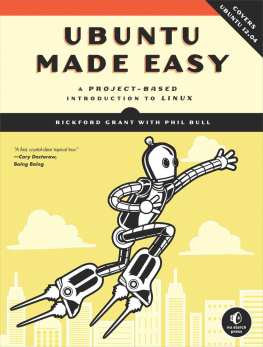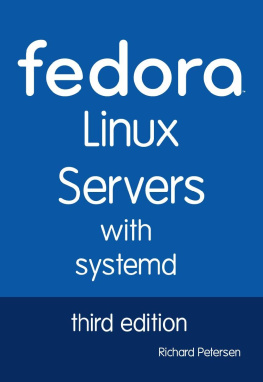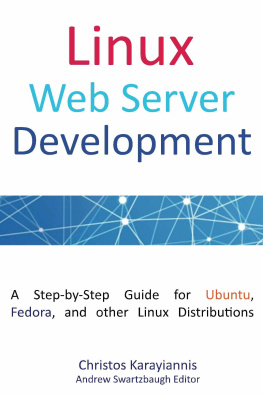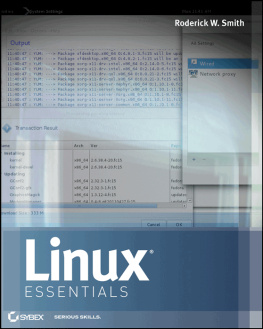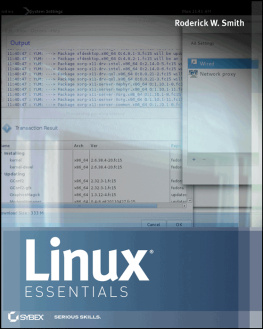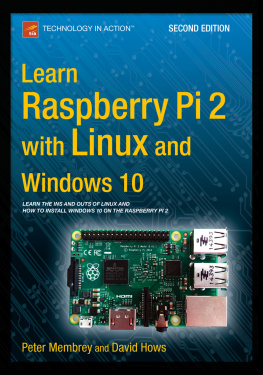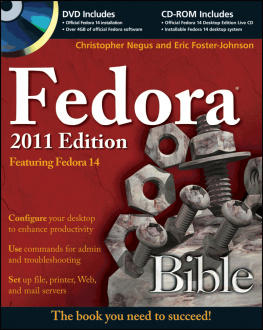Linux For Non-GeeksA Hands-On, Project-Based, Take-It-Slow Guidebook
by Rickford Grant
LINUX FOR NON-GEEKS. Copyright 2004 by Rickford Grant.
All rights reserved. No part of this work may be reproduced or transmitted in any form or by any means, electronic or mechanical, including photocopying, recording, or by any information storage or retrieval system, without the prior written permission of the copyright owner and the publisher.
Printed on recycled paper in the United States of America
1 2 3 4 5 6 7 8 9 10 07 06 05 04
No Starch Press and the No Starch Press logo are registered trademarks of No Starch Press, Inc. Linux is a registered trademark of Linus Torvalds. Fedora is a trademark of Red Hat, Inc. Other product and company names mentioned herein may be the trademarks of their respective owners. Rather than use a trademark symbol with every occurrence of a trademarked name, we are using the names only in an editorial fashion and to the benefit of the trademark owner, with no intention of infringement of the trademark.
Publisher: William Pollock
Managing Editor: Karol Jurado
Developmental Editor: Hillel Heinstein
Cover and Interior Design: Octopod Studios
Technical Reviewer: Joseph Arruda
Copyeditor: Andy Carroll
Compositor: Wedobooks
Proofreader: Stephanie Provines
Indexer: Kevin Broccoli
For information on book distributors or translations, please contact No Starch Press, Inc. directly:
No Starch Press, Inc. 555 De Haro Street, Suite 250, San Francisco, CA 94107 phone: 415-863-9900; fax: 415-863-9950;
The information in this book is distributed on an As Is basis, without warranty. While every precaution has been taken in the preparation of this work, neither the author nor No Starch Press, Inc. shall have any liability to any person or entity with respect to any loss or damage caused or alleged to be caused directly or indirectly by the information contained in it.
Librar y of Congress Cataloguing-in-Publication Data
Grant, Rickford.
Linux for non-geeks : a hands-on, project-based, take-it-slow guidebook / Rickford Grant.
p. cm. ISBN 1-59327-034-8
1. Linux. 2. Operating systems (Computers). I. Title. QA76.76.O63 G723 2004
005.4'32--dc22
2003024732
Dedication
This book is dedicated to the memory of my uncle, Boris Ivan Pavlovich, who always seemed to me the incarnation of what being young-at-heart meant, and to Herr Harry Kennedy, my German teacher at Los Angeles City College suave, cool, open- hearted, and the kind of teacher I have always tried to be. He not only taught us German, but also brought us into the world of Candide, Schweik, and Wolfgang Hildesheimer.
Acknoledgements
I always thought that the acknowledgments sections in books were a bit pretentious
something like the never-ending list of thank-yous of an Academy Awards acceptance speech. However, once you get down to writing a book, you realize that there actually are a lot of people who help you along the way, and the desire to thank them is real and right enough. For that reason, I too want to offer my thanks now to all those who helped out in one way or another, whether directly or indirectly.
First and foremost, I want to thank my wife Sumire for encouraging me to put my knowledge to use and write, rather than just goof around on the computer, and for putting up with being a little ignored while I was writing this book. Then, of course, I must thank my mother, Dixie Angelina Burckel-Testa, for being one of the reasons this book got started and for helping out with some of the initial proofreading. And then, of course, I must also thank my aunt, Danica Lucia Zollars, for uttering the two words that are the reason you are reading this now: Publish it.
Of course, the folks at No Starch Press were the ones who actually did publish it, and so I really want to thank Hillel Heinstein, Karol Jurado, and William Pollock for making it possible, guiding me along, pointing me in some new directions, and making the whole process seem not only like a team effort, but also a whole lot of fun.
My interest in computers and the sum total of my knowledge about them is really the culmination of the experience I gained from, or in the company of, a number of people I would be dreadfully selfish to leave out. These include a number of friends and colleagues from my various phases as a computer user and enthusiast: Sheldon Rudolph, from the good old Atari XL600 days; Donald Hammang, from the Commodore 64, Windows, and OS/2 days; Russel Park (who first took me online), Keith Hagan, and Tracy Nakajima from my early Mac days; Masaki Kameko, who was my Unix command guru when I first got started in the world of Linux; and Andrzej Kozlowski, from my Mac OS X days, who is actually inadvertently responsible for getting me into the world of Linux, whether or not he realizes it.
It would also be terribly remiss of me not to thank my work colleagues, Setsu Uesaka and Toshiko Takagi, for lending me bits of hardware here and there during the writing of this book. Yes, they lent me everything from paper punches to laptop computers, and all they got out of it was a recipe for killer martinis. Sweet vermouth just doesnt cut it, Toshiko san.
Then there are also those equally important souls who did their part by lending an ear when I couldnt shut up, pushing me on when I lost my way, and doling out the tea and sympathy when I needed it most: my friends and colleagues Karen Fedderholdt, James Porcaro, Lisa Snyder, Hiroshi Sakamoto, and my former linguistics professor at Portland State University, Kimberly Brown, who gave me the confidence to write, and encouraged me to do so.
Special thanks are also due to those people who had a more indirect effect on the production of this book but were ultimately a great influence in the total scheme of things Anders Grant, Stephanie Garrabrant-Sierra, Steven Young, Dick Petrie, and Kimberly Jo Burk.
Finally, I turn to the kitties. Yes, Muju, my cat, who had to forsake her late- night grass-eating walks on a leash while I busied myself writing, and the Great Saw (aka Melissa), who is the living definition of
Preface
My own computing life began long ago in the Commodore/Atari days. The purchase of my first machine, no doubt inspired by Alan Aldas television commercials at the time, was an Atari XL600 with a cassette drive for storage, and 16KB of RAM more than I thought I would ever need at the time (ha!).
Most of my time on that machine, I must admit, was spent playing cartridge- based games and typing in pages and pages of machine code from the now-defunct magazine Antic to create even more games. Eventually, my interest in computers increased, especially after seeing my first, and actually the first, Macintosh at the UCLA bookstore. The very in-your-face nature of the Macs operating system caused me to become an operating-system maniac. To date I have worked with almost every operating system there is or ever was, including Mac operating systems up to and including OS X, every Windows version from 3.1 to XP, and even IBMs much forgotten OS/2.
Though tempted to join the Linux fray, I continued to steer away from it for a long time, because I could not help but see it, as so many others do, as a system for never-seen-the-light-of-day-faced, late-night Dr. Pepperdrinking, Dominos- pizza-eating compu-geeks. Moving to Japan and being surrounded with machines loaded with Japanese versions of Windows, however, presented me with numerous problems, such as language constraints. As everything, including help files, was written in Japanese, I ended up using only a fraction of the full potential of most software. Then there were those annoying Windows-type problems, such as the constant freezes and restarts, and the gradual system slowdowns, which were eventually only remedied by reinstalling the system. Getting the software I needed to do the things I wanted to do also took its toll on my wallet, and I began to rethink my initial resistance to Linux. With Linuxs multilingual support, system stability, and extensive and free software packages, there were plenty of incentives for me to get over my obsession with the stereotypical Linux user.


